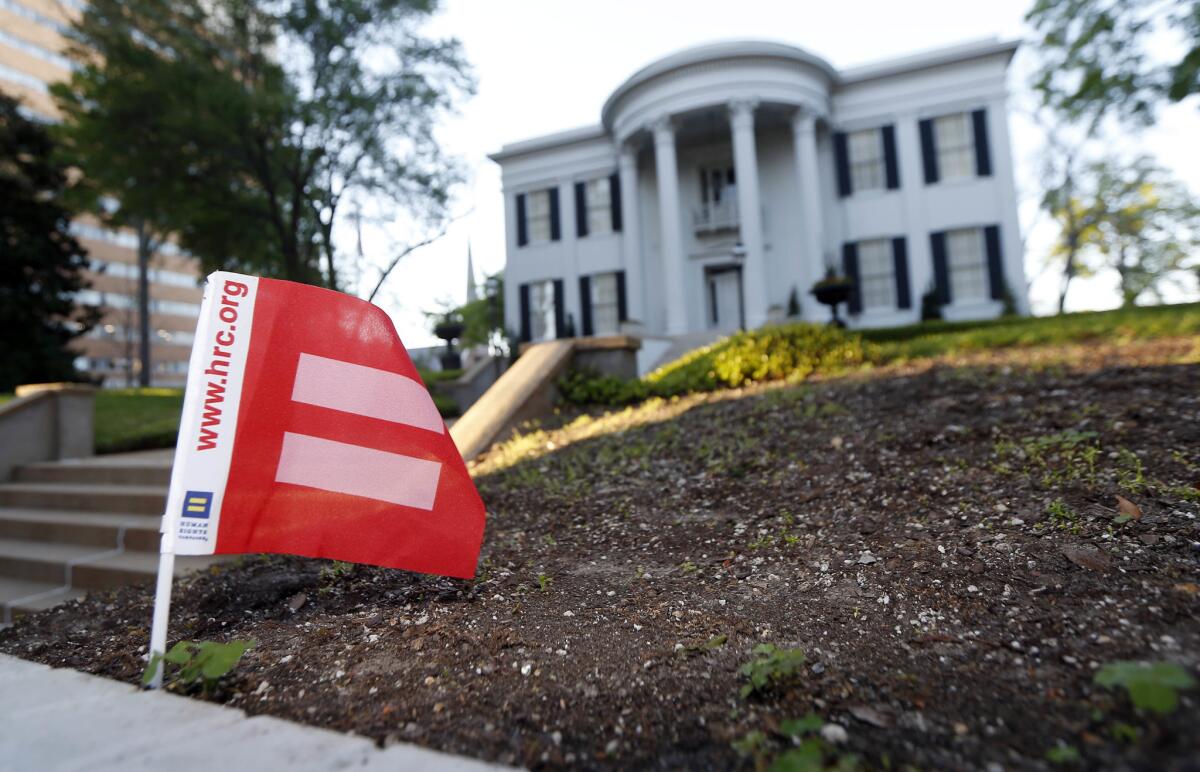Mississippi law opens a new front in the battle over gay rights

A Human Rights Campaign equality flag is planted at the edge of the grounds of the governor’s mansion in Jackson, Miss.
- Share via
Reporting from Atlanta — As the state-by-state battle over gay rights rolls on, Mississippi’s governor has signed a “religious freedom” law that may go further than any other state in clearing the way for businesses and government workers to deny basic services to LGBT couples.
The Mississippi law, signed Tuesday by Gov. Phil Bryant, allows government employees to refuse to issue marriage licenses or perform marriage ceremonies and permits businesses and faith-based groups to deny housing, jobs and adoption and foster-care services to people based on their sexual orientation.
Dubbed the “Protecting Freedom of Conscience from Government Discrimination Act,” the law would also let physicians and other medical professionals “decline to participate in the provision” of sex reassignment procedures, psychological counseling or fertility services.
“This is a sad day for the state of Mississippi and for the thousands of Mississippians who can now be turned away from businesses, refused marriage licenses, or denied housing, essential services and needed care based on who they are,” Jennifer Riley-Collins, executive director of the American Civil Liberties Union of Mississippi, said in a statement.
Legal experts say the law, which takes effect in July, is the most extensive “religious freedom” measure approved since last year’s landmark U.S. Supreme Court decision legalizing gay marriage.
Written by Republican Philip Gunn, speaker of the Mississippi House of Representatives, the law claims to provide protections to people, religious organizations or private groups who hold a “sincerely-held religious belief” or “moral conviction” that marriage is the union of one man and one woman, that sexual relations should take place only inside such marriages, and that the terms “male” or “female” refer to individuals’ “immutable biological sex.”
It prevents state government from taking discriminatory action against any churches, religious charities and private businesses that decline services to people violating their religious beliefs.
Bryant said the law was an attempt to prevent government interference in people’s lives, and that it underscored the religious freedoms protected by the 1st Amendment.
“This bill does not limit any constitutionally protected rights or actions of any citizen of this state under federal or state laws,” he said. “It does not attempt to challenge federal laws, even those which are in conflict with the Mississippi Constitution, as the Legislature recognizes the prominence of federal law in such limited circumstances.”
The broad legislation has met with sustained opposition from LGBT groups, businesses and the Mississippi Economic Council. They say the law sanctions discrimination against lesbians and gays.
“This law goes further than any other bill in the country right now,” said Jody Owens, managing attorney of the Southern Poverty Law Center in Mississippi. “It’s broad enough that it encompasses every function of one’s life.”
Owens said the bill would appear to give a landlord the right not to rent to any two people living together before marriage and permit employers to fire workers based on their sexual orientation.
One gay rights advocacy group, Freedom for All Americans, called the law “the nation’s worst piece of anti-LGBT legislation.”
“Indiana and North Carolina’s anti-LGBT laws were horrendous, but Gov. Bryant’s bill goes even further in denying critical protections and enabling discrimination against LGBT individuals,” Matt McTighe, executive director of Freedom for All Americans, said in a statement.
Riley-Collins predicted the law would stand “as the Magnolia State’s badge of shame.”
Last month, North Carolina Republican Gov. Pat McCrory signed into law a measure that limits anti-discrimination protections for LGBT people.
Georgia Gov. Nathan Deal, also a Republican, vetoed a religious exemptions bill under pressure from businesses.
And a week ago, Virginia Gov. Terry McAuliffe, a Democrat, vetoed a bill that would have allowed businesses and individuals to cite their religious beliefs as a reason for denying services to same-sex couples. Not only would the law allow discrimination in the name of religious freedom, McAuliffe said in a statement, but it would have been bad for business.
“We should be pursuing policies to make Virginia a more vibrant and welcoming place to live, work and raise a family,” McAuliffe said.
Such bills have prompted strong opposition from multinational corporations. On Tuesday, PayPal announced that it would no longer move forward with its planned expansion into North Carolina following the state’s anti-LGBT law. Dan Schulman, PayPal’s president and chief executive, said in a statement that the law “perpetuates discrimination” and “violates the values and principles that are at the core of PayPal’s mission and culture.”
The San Jose-based company’s planned global operations center in Charlotte would have employed more than 400 people.
Other companies that have spoken out against North Carolina’s law include American Airlines, Apple, Bank of America, Facebook, Google, IBM, Microsoft, Twitter and Yahoo.
Jarvie is a special correspondent based in Atlanta.
ALSO:
Get ready for more state-level showdowns over LGBT rights
PayPal cancels North Carolina expansion over LGBT discrimination law
North Carolina’s attorney general says he won’t defend transgender law in court
More to Read
Sign up for Essential California
The most important California stories and recommendations in your inbox every morning.
You may occasionally receive promotional content from the Los Angeles Times.











